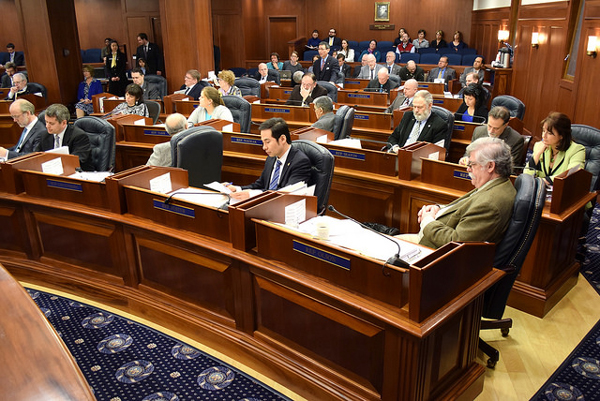
Last night, the Alaska State Legislature failed to meet their 90-day deadline after the House and Senate couldn’t reach an agreement on a major education bill. Lawmakers stayed on the floor until 4am trying to wrap up their work, but it was not enough. Now, they’re back at the Capitol for a 91st day of session trying to hammer out a deal.
APRN’s Alexandra Gutierrez is there with them right now. Hello, Alexandra.
Hello, Lori.
Has any progress been made on the education bill?
The Senate just finished their debate and passed their version 16-4, with Anchorage Democrats opposing the legislation. The bill before them was introduced by the governor and is a major priority for him. It’s a pretty sprawling piece of legislation, and it includes provisions to that make it easier to establish charters school, gets rid of the high school exit exam, all sorts of things. But the big hang-up has been the education funding question.
The governor started the session with an $85 increase to the base student allocation in it, with future increases promised. That’s the amount of money a school gets for each student, and every $100 increase is worth about $25 million. The House more than doubled that number, with an education package worth about $250 million over three years. The Senate went even higher – up to $330 million — but they offered that money as one-time funding.
That’s where things blew up.
Many education advocates have been screaming for that money to be put into the base student allocation because it gives schools a lot more security. If the money is a one-time thing, there’s no guarantee the school districts won’t have to come back and ask for it again to help make up their budget gaps and avoid teacher layoffs.
The debate that happened in the Senate is kind of a pro forma thing. Democrats offered amendments to the bill, but none were adopted. The real fight will happen when the bill gets sent back to the House, because it could trigger a pretty unusual negotiating process called a free conference committee.
Can you explain what that does?
Last night, as everyone was kind of slaphappy and it was clear that the Senate and House just did not see eye to eye on education funding, I heard one legislator describe it as a committee with super powers. The House will send a few of their people, the Senate will send theirs, and then they hammer out their differences in a way that hopefully works for both bodies. In a normal conference committee, you pick and choose the bits that each side like. But in free conference, you have the power to add completely new stuff and dramatically change the bill.
It’s something that’s really only used when there’s a major impasse. But because the committee has the power to add entirely new language to the bill, there’s a risk for things to get messy.
Are there any other hang ups beyond funding?
There are a few. The House doesn’t like that the Senate took out language that lengthens the probationary period from three years to five years before urban teachers can get tenure. They also don’t like that the Senate version requires municipalities to take on a bigger burden in funding education. That provision could result increased property taxes in some communities, which doesn’t really play well in an election year.
So, how long can session go at this point?
Even though voters put a 90-day limit on the legislative session a few years back, the Legislature can meet up to 121 days without running afoul of the Constitution. Obviously, people want to get out as quickly as possible, but since they’ve already blown the deadline, they may as well try to get things done as best they can and finish work on other bills that were at risk of dying.
How much work is left unfinished, aside from education?
Well, the two other big priority bills did pass this weekend. At the beginning of session, Gov. Sean Parnell asked the Legislature to put a few billion dollars toward the pension system and to pass a bill that allows a massive natural gas pipeline to be built. The Legislature did that. That’s done. That’s off their plate.
But there are still dozens of lawmakers’ personal bills that got close to passing, but were then held up either as leverage in negotiations or were just caught up in the logjam as things fell apart this past week. Those cover everything from a popular crime reform bill to legislation allowing the DMV to offer license plates with bears on them.
agutierrez (at) alaskapublic (dot) org | 907.209.1799 | About Alexandra




